Interview with SMASH Executive Producers Neil Meron, Craig Zadan and Theresa Rebeck
Maj Canton - February 6, 2012
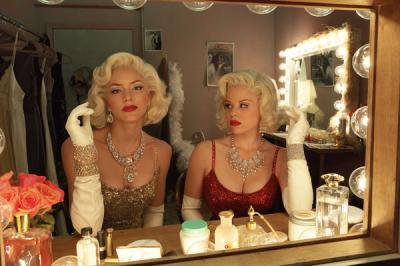
Text and images used with permission of NBC.
Will a new musical about Marilyn Monroe be a smash hit or will Broadway simply smash the dreams of this production's stars, chorus and choreographers? NBC's new scripted drama series, SMASH, goes behind the scenes, revealing the betrayals and comaraderie amongst a group of people who are creating a Broadway musical about the life of The Blonde Bombshell.
Before you watch SMASH, go backstage and check out this interview with SMASH Executive Producers Neil Meron, Craig Zadan and Theresa Rebeck. They dish about the first season, reveal their favorite moments of the pilot and discuss the series' elaborate musical sequences. Then, you can relive the first Broadway experience of each SMASH star -- Debra Messing, Anjelica Huston, Jack Davenport, Christian Borle, Katharine McPhee, Megan Hilty, Raza Jaffrey, Brian d'Arcy James and Jaime Cepero.
Tonight, NBC presents the series premiere of SMASH, airing Monday, February 6, 2012 at 10pm ET/PT.
|
|
|
|
Interview with Executive Producers Neil Meron, Craig Zadan & Theresa Rebeck
|
|
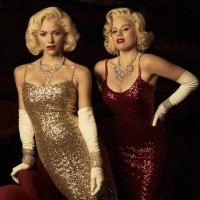 |
Question: Talk about the genesis of SMASH, how the show came together. Neil: The genesis of SMASH was a phone call from Steven Spielberg. You know, anybody in this business thinks of the day when your phone rings and it is a message that Steven Spielberg would like to see you. He told us about a project that he was developing at Showtime with Bob Greenblatt about the creation of a Broadway musical and as the words came out of his mouth, we knew we had to be a part of this because it is very much a part of our DNA. So we were incredibly grateful. |
|
Craig: After Spielberg offered us the job, we sat around kicking around ideas on who else should come on board. That was when we discussed Theresa Rebeck; we needed somebody who was both a playwright and screenwriter/TV writer. Someone who knew how to structure a TV show but also who knew the theater so that it would be authentic. So in that first meeting, we discussed Theresa as a great choice. We had just finished working with Marc Shaiman and Scott Wit tman on a movie of "Hairspray." And Steven had been working with them on their adaptation of "Catch Me If You Can," which they were doing on Broadway at that moment. We came to the conclusion that they would be a fantastic choice to write the original songs.
Theresa: We started with the idea of the Marilyn musical – and then Marc Shaiman and Scott Wittman came in and wrote the songs. Then our choreographer, Joshua Bergasse, began to create the dance numbers. We kept adding layers – and it's grown over time. For example, the baseball number began with me at a typewriter and then it became an actual song when Shaiman and Wittman wrote the song – and all of a sudden I was in a room with a lot of dancers who were bringing the whole scene to life. |
|
|
|
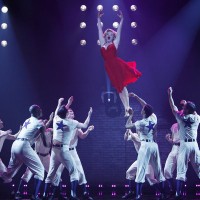 |
Question: What are some of the challenges for both the story and character in mounting a musical drama for television? Craig: Everybody in the TV business knows that the most difficult job in entertainment is the one-hour drama because it requires a relentless amount of time. Once it begins, it never ends. There is no time off; there is no time to think. It is a really hard job and that is just for a one-hour drama. |
|
Craig (cont): And then our entire music team starts working on them, the arrangements, orchestrations and all of that. And you have a schedule for the actors who barely have enough time to shoot the scene, and while they are shooting the scene, they have to be pulled out to go to the recording studio to record their vocals. It is truly like doing three series at the same time. It is a monumental task.
Theresa: There are so many puzzle-like pieces that all must come together. There is a psychotic number of layers. We have to create the songs and the context for the songs within the musical and then around that we have the story of the lives of the director and writers and producers -- and the actresses who are vying for the starring role within the musical. |
|
|
|
|
|
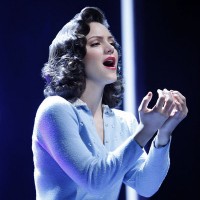 |
Question: Why do you think SMASH has broad appeal – beyond Broadway, beyond show business. What is it about this story that makes you want to follow the characters' journeys? Neil: With SMASH, the great thing we are all trying to do, is to use Broadway as a microcosm of the bigger world. When it comes to the betrayals, the love relationships, the business relationships -- every kind of relationship that exists in our world is a reflection of the greater world. Which is why the show is so accessible, and why people will instinctively relate to the characters. Even though they may not do that same job every day, they can relate to these people because the emotion is the same, the dynamics are the same. |
|
Craig: The goal we have for SMASH is to make it as universal as possible. The show is about dreams, it's about escapism, it's about fantasy. It's about making your dreams come true. Whether you go for your dreams, or live a practical life, or take risks with your life and career. There is always that edge of "Am I making the right choice? Am I wasting my time? Am I spending my youth on a dream that is never going to amount to anything? Could I really MAKE IT?" You're rooting for these people to pursue their dreams -- because if they can succeed at it, you can succeed in fulfilling your dreams as well.
Theresa: We are trying something different – to create a muscular musical drama much like the great TV series such as THE WEST WING and NYPD BLUE – shows that strive for dramatic excellence. Music has always been a huge part of melodrama – and we are still learning about how the music can emerge from the story. SMASH has that great television template of many lives going in many directions and at the center is the spectacularly compelling story of Marilyn Monroe and her rise to fame in this iconic American way. |
|
|
|
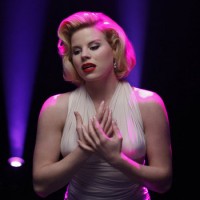 |
Question: What is it like working on a project about an icon like Marilyn Monroe? Theresa: I'm completely in love with her right now. I've read a lot of books about her and I find her story compelling and funny and human and tragic. The men she was involved with were also iconic: Joe DiMaggio, Arthur Miller and JFK. Her story is so powerfully American – coming from nothing to become one of the most famous movie stars in the world. But what makes her so appealing is that she was a sex symbol who was searching for love. The American musical is all about love, so she is a natural subject to be at the heart of this television event. |
|
|
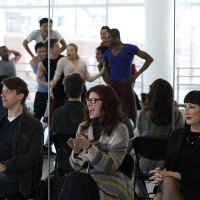 |
Question: What do you think is the biggest difference between producing for Broadway and working on a film or television show? Neil: Broadway is incredibly fulfilling for a producer because of being the decision maker. In TV or film, there are many layers above you who try to weigh in and it is more of a collaborative effort than it is on Broadway. So producing on Broadway is more distinctly realized and is a singular entity rather than a collective one.
Craig: For Broadway, you are the boss. The lead producer of a Broadway show is in charge of every decision that gets made; whereas with a TV show or a feature film, it is a collaboration with a lot of people involved. |
|
Theresa: Television is definitely a different realm than theater. You have to shift your brain into forward motion for television. Time and space work completely differently on a television show. One of the main challenges in television is to get to the point of the scene as quickly as possible. But with television, in terms of storytelling, there are a lot more tools in your toolbox. For example, in SMASH we can incorporate the best of both musical theater and television. We can create a fantasy scene and still show the actual magic of how light works on a stage in a dynamic way – and we can use music to extend the emotions of a scene. |
|
|
|
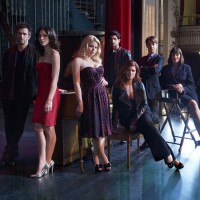 |
Question: How was SMASH cast? Tell us about the process of putting this ensemble together. Neil: Debra didn't audition. We were in the very fortunate position where actors were extremely interested because Michael Mayer was directing it, and Theresa had written such a great script. It had great advance buzz because of the script itself. Debra got ahold of the pilot script early on and she came to us. When she presented herself very early in the casting process, we didn't have to look any further. I mean it was Debra Messing! She perfectly embodies the character of Julia. We can't imagine anyone else in that role. Her surprising dramatic chops mixed with her comedic chops create a very complex character. The audience is going to see a more mature and richer actress, a great warm presence that lets us into this world. And Jack Davenport we had seen in PIRATES OF THE CARIBBEAN and FLASH FORWARD. We initially conceived of the role as an American director, but we thought having an Englishman as a director would be an original twist. So when Jack was presented for the role, we couldn't have been happier. |
|
Craig: Some of the actors were people that we knew or knew of and that we immediately thought would be great to have on the show. We had never met Anjelica Huston, but we thought she was great and we always wanted to work with her. And she had never done a TV show. It was a coup and it was very exciting to have her be a part of this. I would say that we knew Kat only through AMERICAN IDOL and how talented and wonderful she was. Although we had not understood at that point early on how great an actress she would be. Once we started working with her, we discovered that she is just as good an actress as she is a singer. Megan came up because Bob Greenblatt had produced the Broadway show "9 to 5" and she was one of the stars of that show and he recommended her. The moment we started auditioning her and working with her, we thought she was quite special and astonishing. Christian Borle, we had seen in lots of Broadway and off-Broadway shows and thought he was an enormous talent and the perfect match for Debra Messing as the song-writing couple.
Theresa: We, of course, love both of our ‘actresses,' but there are already teams forming around each of them. Megan Hilty (Ivy) appears to be Marilyn incarnate; she is a veteran Broadway star who is the embodiment of Marilyn. Kat McPhee (Karen), on the other hand, captures Marilyn's innocence and beauty, her raw sexuality – the young star in the making. It is a thrill to watch them both sing and perform these two versions of Marilyn brilliantly. |
|
|
|
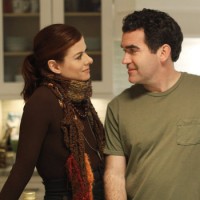 |
Question: What will happen to the characters on SMASH during the first season? Theresa: Julia (Debra Messing) is involved in an international adoption with her husband – and there are lots of complexities around that. Eileen, the producer (Anjelica Huston), is going through a nasty divorce – and we watch her try to round up investors for the show while her husband threatens to sabotage her efforts. There will be lots of jokes because people in the theater world generally have a good sense of humor, lots of high-stakes drama – and lots of people behaving badly and having inappropriate sex. |
|
|
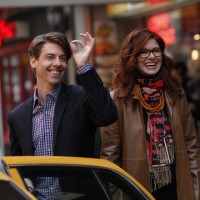 |
Question: What is your favorite moment in the pilot? Neil: In the series, Debra Messing and Christian Borle play a sort-of latter day Betty Comden and Adolph Green. And Christian's character, Tom, comes back from a trip to London, and he is discussing with Julia (Debra's character) a revival of "My Fair Lady." Julia says: "Why isn't anybody doing new musicals? New books. New scores?!? " And I love that moment because that's what we hope SMASH accomplishes. It is a continuation and an extension of the love of musicals to another medium. We have been fortunate enough to work on Broadway musicals, television musicals and movie musicals. And now we are bringing a new kind of story-telling to television, one with all the elements that we love about a great Broadway musical combined with the classic character-driven drama that we love to watch unfurl in a television series. |
|
Craig: My favorite moment in the pilot is the finale with "Let Me Be Your Star." It takes all the elements of the musical that we have done in the hour and it consummates in one final storytelling explosion of the audition, through the eyes of all the characters being in one place at one time and seeing our two singers in the show singing this fantastic Scott Wittman and Marc Shaiman song.
Theresa: My favorite moment in the pilot actually got cut. Several of our major characters -- who are all obsessed with the theater -- came out and said, quite simply, "I hate the theater." We keep trying to get that line back in the show. I like it because these people are just obsessed with the theater. But they all, also, really do hate it and wish they could just figure out how not to be so obsessed with it. |
|
|
|
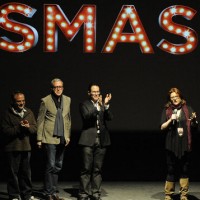 |
Question: How did you get your start in theater? Neil: We got our start in the theater working for Joseph Papp at the Public Theater and we started the New York Shakespeare Festival. Joe was our mentor – he was our father figure, he was the man that taught us everything about how to work with actors, how to work with writers, how to work with directors. Everything that we now know when we work on a movie, a TV show, or a show on Broadway, we know because of Joe. And we owe him our careers and our vision because he gave us his vision, and we will always be grateful to him for that.
Theresa: I started in high school, as an actress. I was also writing a lot at the time. When I was about 16, it occurred to me that I could combine acting and writing and end up with playwriting. It seemed like a sensible solution. |
|
|
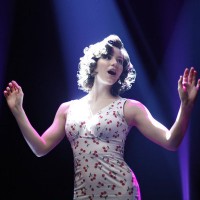 |
Question: What's the one impression about the business you would like to convey with the show? Neil: What we want to show to the larger public about theater is that working in the theater is not as rarefied as people may think. When you look at television shows that are set in offices -- all the police dramas, advertising agencies or corporate dramas, we are basically in a work place environment where all the issues are the same, except these people are creating a Broadway musical with singing and dancing. The issues are completely universal. |
|
Craig: We want to show that if you stick to your dreams and fight for them and don't give them up … you can accomplish success in that realm. That is shown very clearly by the characters. It is sort of what you learn when you watch reality shows like SO YOU THINK YOU CAN DANCE and AMERICAN IDOL. You see what people have to go through in order to achieve success in their lives and careers. This is the first time you have actually seen this in a one-hour scripted drama versus reality TV.
Theresa: I love how much heart theater people have. They are people who are willing to throw caution to the wind all the time, people who believe that pain matters, and that love matters. The obstacles they face are so cruel, and so daunting. Maybe because of all that theater people are really funny. And they are all terrific storytellers. It's a lively and funny tribe. I think audiences will like them. |
|
|
|
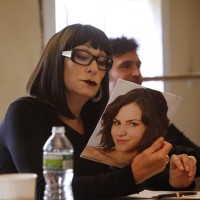 |
Question: SMASH was originally developed for premium television. How will it differ on broadcast television? Craig: When Spielberg pitched us the idea, it was for Bob Greenblatt at Showtime. It was going to be an edgier, grittier, darker show. And it actually ended up being a much more audience-friendly show for NBC. There are certain cases where you take a show and you do it for cable and it deserves to be on cable and must be on cable. This is one of those shows that serves itself better by being a network show for a broader audience -- it makes it more accessible. |
|
Neil: When we were first expecting to be on Showtime, we were very excited because we thought that we could go deep in terms of language, sexuality, nudity, grittiness and that was very exciting for all of us. When we moved to the network, it gave Theresa a broader scope of the world and the story that she was telling. She now had to be very conscious that it wasn't going to be a niche audience. This was going to be a mass audience, and in that move, it allowed the show to breathe more with bigger stories, arcs and emotional themes and delve into the world outside the insular world of the theater. In that regard, we are thrilled it made the move to network TV and it is going to attract the eyeballs. It is hopefully going to make Broadway more popular than it already is. |
|
|
|
The SMASH Stars Relive Their First Broadway Experience
|
|
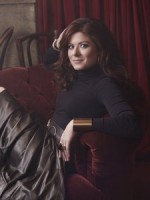 |
Debra Messing: "The first Broadway show I saw was ‘Annie' and it was life-changing. I nearly levitated out of my seat I was so amazed. All I could say to my parents afterwards was 'I WANT TO DO THAT!'" | 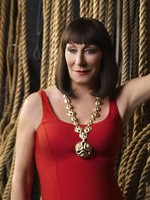 |
Anjelica Huston: "The first time I came to Broadway was in 1969, as an understudy for Ophelia, in Tony Richardson's production of Hamlet at the Lunt-Fontanne. I had understudied Marianne Faithfull at the Roundhouse in London, and gone onstage quite a few times. But Francesca Annis replaced Marianne when the production traveled to New York City, and Francesca was not an understudy's dream...much to my disappointment, she never missed a performance!" | ||
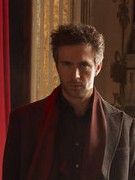 |
Jack Davenport: "My first Broadway experience was technically speaking off-Broadway, but memorable nonetheless. Twenty years ago, I found myself in the audience for one of the very first performances of The Blue Man Group. I remember wishing that more theater could be like this, as the grand finale came to an end, and we found ourselves unspooling hundreds of toilet rolls over our heads while those funny little blue guys kept whacking their drums full of paint. I wish I could say I'd been to a profound production of ‘The Iceman Cometh.'" |
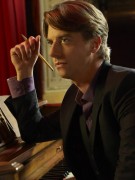 |
Christian Borle: "When I first moved to NYC to try to get a job on Broadway, I would fork over my savings to see shows at theaters like The Shubert, The Richard Rodgers, The Music Box and The Palace. Sitting in cheap, nose-bleed seats in historic old houses, watching performers the size of ants, I felt happy. Sepia-toned, toe-tapping, childhood happy. I got to walk through the stage doors of those theaters over the following years, to actually be in shows on Broadway. And that feeling -- It's technicolor, adrenaline, adult happy." | ||
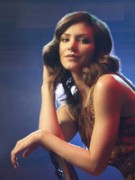 |
Katharine McPhee: "I remember seeing 'Les Miserables' on my first trip to New York. It's such an iconic show and so powerful. It was an incredible night and something I will never forget." |
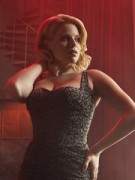 |
Megan Hilty: "My very first Broadway experience was watching the famous videotape recording of ‘Into the Woods' with the original cast. I instantly fell in love with the stories and the music – and that's when I became a huge fan of Bernadette Peters. Her performance was thrilling and ultimately inspired me to seriously consider a career in the performing arts. Who knew that years later I would be lucky enough to play her daughter in a TV show about musical theater?! It's the ultimate definition of a dream coming true!" | ||
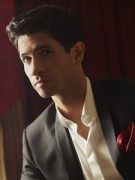 |
Raza Jaffrey: "My earliest trip to a West End theater was to see ‘The Sound of Music' at The Apollo Victoria in London. I can't remember much about the show (my intermission ice cream aside!) – but I do remember wishing I was up there doing what those children were doing. And although it took me a few years, I was pretty delighted to find myself back there, up on the stage this time, for my own opening night of' ‘Bombay Dreams.'" | 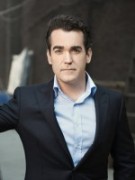 |
Brian d'Arcy James: "The first Broadway show I saw was ‘Dreamgirls' at the Imperial. Absolutely loved the show. What struck me first, however, was how close in proximity all the theaters on 45th Street were to each other, each marquee shining brighter than the next. Twenty-five years later, I played the Imperial with ‘Dirty Rotten Scoundrels,' a very poignant, full-circle moment." | ||
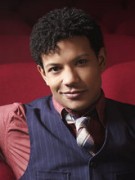 |
Jaime Cepero: "When I was around 12 years old, I think the closest thing to Broadway I'd ever experienced was a Christmas play at church. There was a PBS ‘Great Performances' showing of ‘Into the Woods' that I happened to catch on TV. Everything about it made me happy – especially the music. But Bernadette Peters and Joanna Gleason absolutely blew me away with their performances. From then on, it was Broadway or bust." | |
|||
|
|
